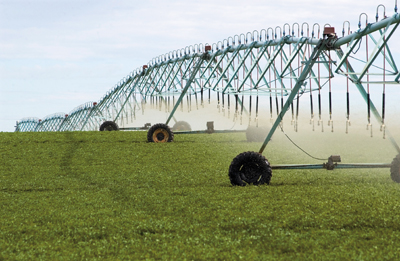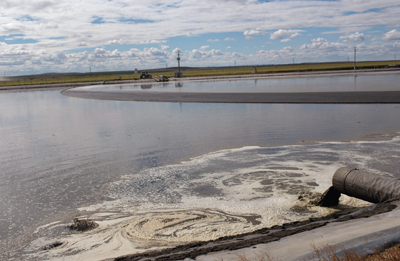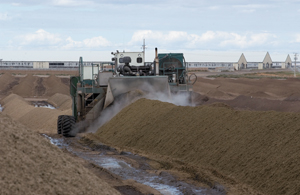
A contract composting set-up
at a huge dairy farm operation in eastern Oregon has found success
thanks to a focus on producing a quality and consistent product.
A contract composting set-up at a huge dairy farm operation in eastern Oregon has found success thanks to a focus on producing a quality and consistent product.
The dairy operations of Threemile Canyon Farms LLC near Boardman, Oregon have one heck of a lot of manure to deal with on a daily basis.
 The farm operation is an agricultural leader in the application of dairy manure as liquid fertilizer. Water used to flush dairy barns is collected in clay-lined settling lagoons, with filtered liquids injected into the farm’s mainline irrigation system for precision application to growing crops. The farm operation is an agricultural leader in the application of dairy manure as liquid fertilizer. Water used to flush dairy barns is collected in clay-lined settling lagoons, with filtered liquids injected into the farm’s mainline irrigation system for precision application to growing crops. |
“It’s hard to pin down exactly,” says Russ Davis, who oversees manure management on the massive 93,000-acre farm. “But it’s in the neighborhood of 2,000 tons a day. We figured at one point not too long ago, that we’ve processed over a billion pounds of material.”
Threemile Canyon Farms was set up in 2000 as a joint venture between R D Offutt Co, a major potato grower based in the Midwest, and Bos Family Oregon Farms. Bos is a large dairy operation, based in California. Overall, Threemile Canyon represents a $185 million
investment in state-of-the-art farming technology.
That large quantity of manure is coming from the 22,000 cows Bos has in four separate dairy farms on the Threemile Canyon site. It is one of the largest single dairy operations in the country.
With its size, Threemile Canyon Farms also represents one of the largest agricultural operations in the entire United States. Threemile occupies a big piece of the Columbia River plateau. The property is square, with each side running about 15 miles. As part of an agreement with environmental groups, 23,000 acres has been set aside for conservation.
This former desert land represents a good place for a dairy operation. There is minimal potential for wastewater from the dairy to wash into rivers and streams.
In addition to the dairy operation, the farm grows alfalfa, corn and wheat—and it reportedly grows enough potatoes to feed seven million people. Potato skins and other crop waste are fed to the cows.
 Marty Myers (right), general manager of Threemile Canyon Farms. Marty Myers (right), general manager of Threemile Canyon Farms. |
After R D Offutt purchased the land, bringing in the dairy operation was the brainchild of farm general manager Marty Myers. Oregon’s largest and most famous cheese producer, Tillamook County Creamery Association, was looking to substantially expand production. They were scouting in a number of locations, including in eastern Oregon. Myers urged the company to choose a location near Threemile Canyon, and committed to setting up dairy facilities to serve the new cheese manufacturing facility. The deal was struck.
Overseeing all of the manure management on the farm is the job of Walla Walla, Washington-based environmental consulting firm, Organix, Inc, which, befitting the size of the Threemile operation, has set up a massive composting facility.
The company has been contracted to manage manure on site as well as market and sell all the material produced, the majority of it in the form of compost. They process material to compost, secure its transportation, and help define the pricing and the market for different types of compost material, based on its characteristics such as fertility, pH and salt levels.
Organix was able to gear up the composting operation over the last few years; the dairy operations started up with only a few thousand animals, and gradually grew to the current size of 22,000.
Organix partners Russ Davis and Del McGill are not new to composting—they previously ran a municipal composting operation near Portland, which involved dealing with a huge volume of yard waste. “We were frustrated with the challenges of being located in a wet environment at the edge of sprawling suburbs.
Considering the increasing pressure from government agencies and environmental groups, and the stepped up CAFO regulations, the timing seemed right to explore large scale, on–farm composting,” says Davis.
The Threemile project represented a big task for Organix. “The basic concept behind composting technology is the same regardless of the size of the operation,” explains Davis. “There are, however, challenges to a large scale operation like Threemile.”
While dealing with that amount of manure poses challenges, it also brings benefits, he says, such as economies of scale. “And one of the things it allows us to do is produce a super consistent product.” Unlike yard waste, the content and composition of which varies with the season—lots of grass clippings in the spring and summer, and leaves in the fall—those thousands of dairy cows are churning out fairly consistent manure, 365 days of the year.
The four dairy operations on Threemile each have four barns—three are half-mile long barns, and there is one quarter-mile barn. All of the barns have flush systems, and the material is moved to settling cells.
 Slurry is flushed into one of two clay-lined settling lagoons at Threemile Canyon Farms. Filtered liquids are injected into the farm’s precision irrigation system for fertilizing crops, and solids are composted in the farm’s 120-acre compost facility. Slurry is flushed into one of two clay-lined settling lagoons at Threemile Canyon Farms. Filtered liquids are injected into the farm’s precision irrigation system for fertilizing crops, and solids are composted in the farm’s 120-acre compost facility. |
Manure from the barns is gravity fed into pits. Using 60 hp pumps, it is moved up for separation, using a sloped screen separation system from US Farm Systems of Tulare, California. The slurry goes into settling cells, and then into one of the operation’s two lined lagoons, which have sizes of 22 and 10 acres respectively. The slurry is applied to Threemile’s farmland using their pivot irrigation system.
The soon-to-be compost material is then piled into rows ranging in length from 300 to 600 feet on the 140-acre composing site. “From the start we are monitoring the temperature and the moisture, and we start turning it almost right away,” says Davis.
At Threemile, Organix uses a Frontier F-16 straddle turner. This 16-foot unit features a 350 hp engine, with production rates of upwards of 4,000 cubic metres per hour, according to Frontier. It features a tunnel 16 feet wide by six feet, three inches high, adjustable to eight feet, three inches.
Organix has looked at other windrow equipment on the market, but they found that Frontier works the best, says Davis. “The equipment has the ability to inject more air into the piles, which contributes to us making a better product.”
The F-16 turns over the piles, and when the piles get too short to run the unit over, they use a tow-behind turner, a 12-foot HCL compost turner.
While they now have all the equipment in place at Threemile Canyon, Davis notes they are continually working to improve the operation. “There is a lot of management that goes into it. We are constantly trying to improve our techniques to keep our costs down and turn out a quality product. It’s a challenge.”
While many farm operations have set up composting facilities, Davis notes the real trick is in finding long-term, viable markets. “Composting is a great idea, but it’s not the end of the story. You still have to move it to somewhere, and to somebody. The key is figuring out what are the applications associated with what you are able to produce.” Compost properties, he notes, can differ greatly by NPK values, physical characteristics, salt levels, density and porosity. With these kinds of parameters, there is potential to market compost in a variety of different ways. But it takes focus.
“There are markets for compost, but it takes an entire business plan to do it successfully. You can’t just say, ‘Well, we just want to get rid of our manure.’ What you need to say is we need to move our manure, but we also need to make money, maybe use some of the material to make bedding, and some of it to grow crops. It’s more than waste management. It’s inventory control, manufacturing, nutrient management and more.”
Organix has 70 customers in the Portland market who buy compost material—their product is called “PowerPlant”—for the wholesale market. They sold nearly 100,000 cubic yards in 2004. “That’s a lot of material to move, and our goal is consistency from the first load to the last load. That’s important to our customers,” says Davis.
Some reluctant nurseries have to be won over, he notes. “Some of them are understandably hesitant due to the inconsistency of compost they’ve had in the past. They want consistency in everything they sell. They are used to buying pumice, which is always the same, red fir bark, which is always the same, and they want that consistency in their compost.”
The results tell the story. In 2003, when the farm was still scaling up to its present 22,000 cows, Organix was completely sold out of compost. And the compost they sell is near the top end of the market, going for up to $15 a cubic yard.
While there is always material on the ground in various stages of composting, Organix uses 100-day-old compost as the benchmark, preferring not to sell anything that has been composting for less than that.
Davis said there are some advantages to farms, especially large operations, opting to employ contract operators such as Organix for their composting.
When you come down to it, it’s a completely different business from producing milk, he notes. “Dairymen are used to a small number of billings, but we’ve got dozens of customers, and they all require a high level of service.” That service means delivering a good product, delivering on schedule, and that drivers are courteous and customer-friendly. That’s not to say that dairy operators can’t run composting operations—some do. It’s just that they are in the business of producing milk, not compost, and running a composting business can be time consuming and can take away focus from the primary farming operation.
And the farm recently received a $1 million Conservation Innovation Grant from the NRCS to test and evaluate an innovative anaerobic digester system that would produce renewable energy, return concentrated nutrients back to the farm, and overall substantially reduce the environmental impacts of concentrated animal agriculture operations. The farm could increase operations to eventually host as many as 25,000 cows, with a system capable of producing enough methane to generate up to four mW of power, enough power for about 2,500 homes.
 At Threemile, compost contract operator Organix uses a Frontier F-16 straddle turner to turn the windrows at the compost facility. When the piles get too short to run the F-16 over, they use a 12-foot HCL tow-behind turner. At Threemile, compost contract operator Organix uses a Frontier F-16 straddle turner to turn the windrows at the compost facility. When the piles get too short to run the F-16 over, they use a 12-foot HCL tow-behind turner. |
As for Organix, they have recently started bagging the compost for the retail market, and have set up an arrangement to associate the brand with the very well-known Oregon Garden, one of the state’s most popular tourist destinations. Like any other product, Davis says, a brand carries a lot of weight and the ability to have a brand that is recognized in this market gets them off to a head start.
In general, Davis says they are looking forward to continuing to work with the new generation of dairyman who are emerging these days, a much more environmentally aware group, such as the people at Threemile Canyon Farms.
“They’re beyond seeing manure as just getting in the way of milk production. Our preference is to work with folks who see it as an unprocessed resource, and want to process it in the most profitable and sustainable way for the overall health of their dairy and their neighbors.”